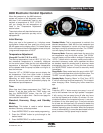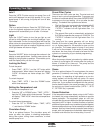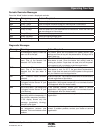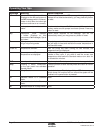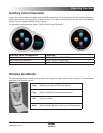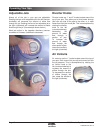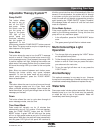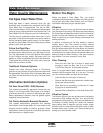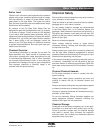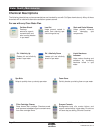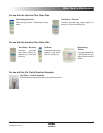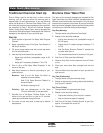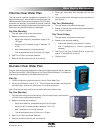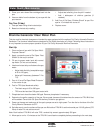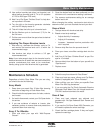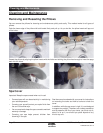
2008 Portable Spa Owner’s Manual Page 21
LTR20081000, Rev. B
Water Quality Maintenance
Bather Load
“Bather Load” is the term used to describe the number of
people using a spa, combined with the length of usage,
and the frequency of usage. All these factors have a
great effect on the spa water. The higher the bather
load, the more chemicals need to be added and a longer
ltration time will be needed.
All versions of the Cal Spas Clear Water Plan are
designed for spas with average bather load. (3-4 people,
15 minutes of usage, 3 times a week at 100 degrees)
If your bather load exceeds these guidelines, and you
experience water quality problems, increase the amount
of ltration rst, (go to the next higher ltration number)
then if water quality is still not adequate, consult the
advice of your Cal Spas dealer for additional chemical
or system recommendations. Be sure to give them your
bather load information.
Chemical Overview
The following information is intended for use with Cal
Spas chemicals only. Other brands of chemicals may
have similar names and/or usage descriptions but due
to manufacturing differences, use of other chemicals
can increase the likelihood of under- or over-dosing the
spa chemicals. Damage to the spa or spa’s components
from improper chemicals or chemical usage is not
covered under the spa’s warranty.
Chemical Safety
Failure to follow chemical directions may result in serious
injury, sickness, or even death.
Read and follow all printed instructions listed on bottles,
packages and in your owner’s manual.
Do not exceed chemical dosages as recommended
in the Clear Water Plan, or on chemical bottles and
packages. (Most chemical instructions are gured for a
500 gallon spa however, most spas hold less than 500
gallons, consult your owner’s manual for the approximate
gallons of your spa)
Never mix chemicals together.
Never change chemical brands or types without
completely draining, ushing and thoroughly cleaning
the spa and cover rst.
Always protect your eyes while introducing chemicals
into the spa. Wear protective eyeglasses to prevent
powdered chemicals from blowing into the eyes or liquid
chemicals from splashing into the eyes.
In the event of overdosing a sanitizing chemical (chorine
or bromine), immediately turn off the power to the spa
and drain water to a safe and approved area. Rell with
fresh water and proceed with the Clear Water Plan start
up.
Physical Chemical Hazards
Do not allow chemicals to come in contact with skin,
eyes or clothing.
Always wear rubber gloves, protective eye wear and
clothing to reduce the risk of chemical contact and
irritation.
Remove and wash clothing that may have been exposed
to chemical contact prior to wearing them again.
Inhaling or ingesting chemicals will cause serious injury,
sickness, or even death.
Do not mix chemicals. Mixing chemicals together can
cause dangerous chemical reactions including the
release of toxic gas, re and explosions.
Chemical Storage
Chemicals must be stored completely out of the reach
of children in an area that is well vented, cool, and dry.
Failure to provide a proper area for chemical storage
may result in serious injury, sickness, re explosion
and even death. Do not store your chemicals inside the
equipment area of your spa.



